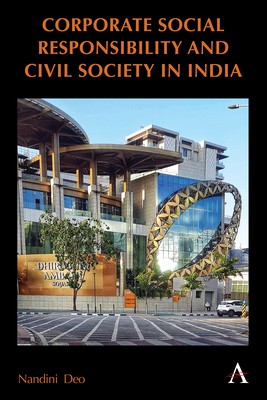
- We will send in 10–14 business days.
- Author: Nandini Deo
- Publisher: Anthem Press
- ISBN-10: 1839985968
- ISBN-13: 9781839985966
- Format: 15.2 x 22.9 x 1.3 cm, hardcover
- Language: English
- SAVE -10% with code: EXTRA
Corporate Social Responsibility and Civil Society in India (e-book) (used book) | bookbook.eu
Reviews
Description
Corporate social responsibility (CSR) or billionaire philanthropy is like a Rorschach test - the same act can look very different depending on how we understand its intentions and its consequences. In this book the author examines the politics of CSR in India to assess its ability to advance inclusive and sustainable development. The focus is on how CSR is remaking the practices and agendas of civic organizations that are being encouraged to collaborate with business to advance equality and prosperity.
Non-governmental organizations (NGOs) and corporations have a history of hostility to each other. According to NGO workers, businesses selfishly exploit workers, despoil natural resources, and distort democracy to serve their own profit-making ends. According to business executives, NGOs are hopelessly naïve, inefficient, and interfere in the market in ways that reduce economic growth. And yet, in the past decade more and more NGOs and businesses are collaborating in new ways. Individuals from both sectors are setting up social impact enterprises, and social investing funds are increasing. The more traditional forms of corporate-NGO collaboration have expanded as more funds are flowing from business to the social sector. The divide between the corporate sector and civil society seems to be narrowing. Why is this happening and what are its consequences? This book examines these trends in India, where since 2013 the state has mandated co-operation between the largest firms and NGOs in pursuit of inclusive and sustainable development.
This book offers evidence that CSR is unlikely to contribute to inclusive and sustainable development. By claiming to be "helpers" corporations are able to silence their critics and thus avoid making the deeper shifts in business models needed in order to create a more just and sustainable society.
EXTRA 10 % discount with code: EXTRA
The promotion ends in 15d.13:54:17
The discount code is valid when purchasing from 10 €. Discounts do not stack.
- Author: Nandini Deo
- Publisher: Anthem Press
- ISBN-10: 1839985968
- ISBN-13: 9781839985966
- Format: 15.2 x 22.9 x 1.3 cm, hardcover
- Language: English English
Corporate social responsibility (CSR) or billionaire philanthropy is like a Rorschach test - the same act can look very different depending on how we understand its intentions and its consequences. In this book the author examines the politics of CSR in India to assess its ability to advance inclusive and sustainable development. The focus is on how CSR is remaking the practices and agendas of civic organizations that are being encouraged to collaborate with business to advance equality and prosperity.
Non-governmental organizations (NGOs) and corporations have a history of hostility to each other. According to NGO workers, businesses selfishly exploit workers, despoil natural resources, and distort democracy to serve their own profit-making ends. According to business executives, NGOs are hopelessly naïve, inefficient, and interfere in the market in ways that reduce economic growth. And yet, in the past decade more and more NGOs and businesses are collaborating in new ways. Individuals from both sectors are setting up social impact enterprises, and social investing funds are increasing. The more traditional forms of corporate-NGO collaboration have expanded as more funds are flowing from business to the social sector. The divide between the corporate sector and civil society seems to be narrowing. Why is this happening and what are its consequences? This book examines these trends in India, where since 2013 the state has mandated co-operation between the largest firms and NGOs in pursuit of inclusive and sustainable development.
This book offers evidence that CSR is unlikely to contribute to inclusive and sustainable development. By claiming to be "helpers" corporations are able to silence their critics and thus avoid making the deeper shifts in business models needed in order to create a more just and sustainable society.


Reviews